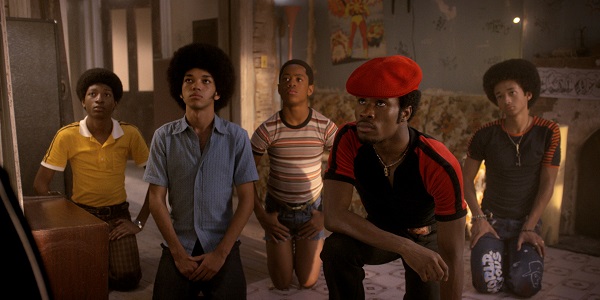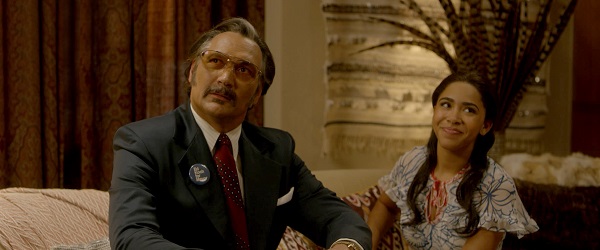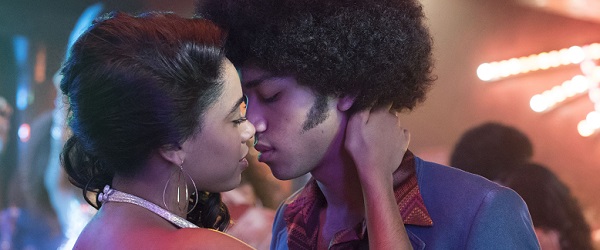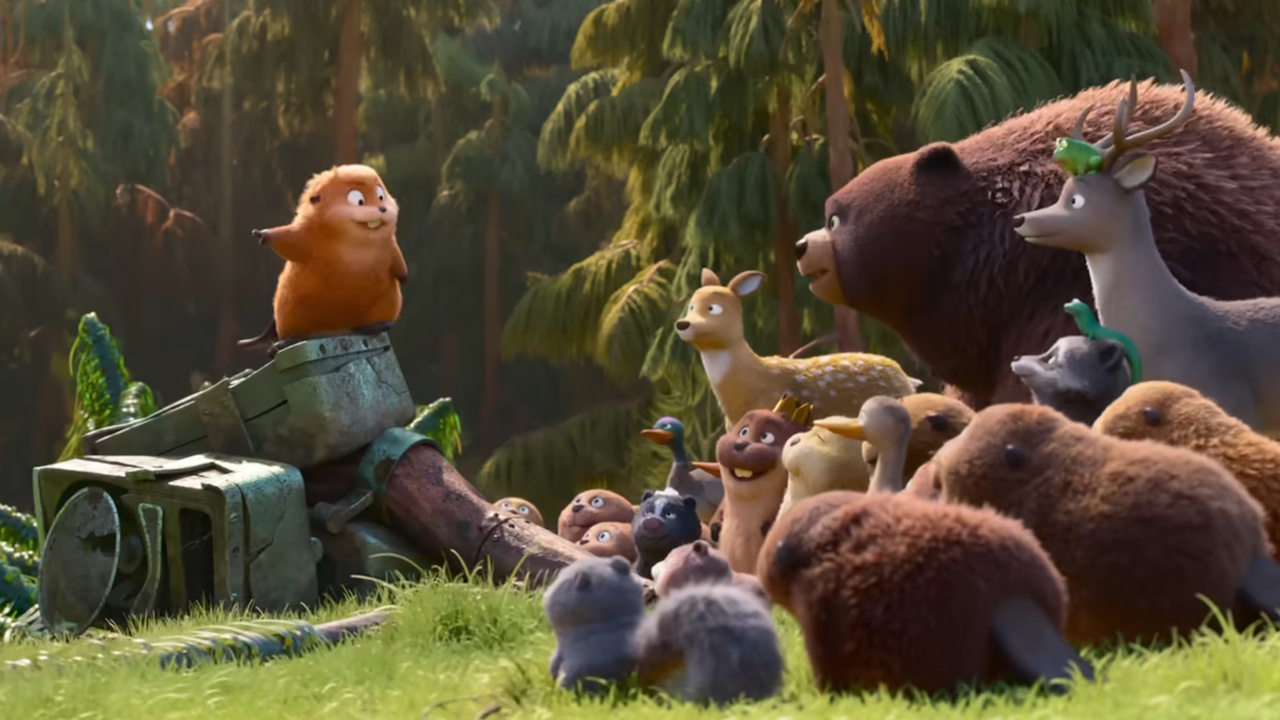The Get Down Review: Baz Luhrmann's Musical Netflix Drama Is Gorgeous, Emotional Chaos

Your Daily Blend of Entertainment News
You are now subscribed
Your newsletter sign-up was successful
It isn't necessary to start things off this way, but I think it's worth noting up top that while I appreciate and admire the lush vision of filmmaker Baz Luhrmann, I'm not the biggest fan of his films (except R+J), largely because I haven't cared much for the subject matter he covers. I know, I know; it's my loss and all. Still, none of it dulled my optimism for Luhrmann's first TV series, the ambitious as funk Netflix drama The Get Down, which he co-created with playwright Stephen Adly Guirgis. And I am all the more pleased to say that this show is the biggest feast for the eyes and ears on TV so far this year. It's also wanders a lot and takes earnest no-distractions dedication, but that's for later.
It's hard to know just where to start talking about The Get Down, as there are a thousand different angles to take with this one, but it all starts with New York City in the 1970s. I won't use the cliched "the city is like another character," but I'll say this show could not exist in a different setting, as it is entirely about the big city atmosphere and culture that gave way to the rise of hip-hop, where words are used as weapons rather than guns. (Although guns are used by those who aren't good with words.) As someone from Cajun Country in Louisiana, I'm as far away from Bronx life as it gets, even the polished grit of his version, but I still feel an unexplainable nostalgia watching The Get Down that speaks to my spirit more than my memory.
The lead character, perhaps, is the Justice Smith's Ezekiel "Books/Zeke" Figuero, a wordsmith trying to develop an edge that is more apparent than his disco-fro and wide eyes always seemingly seconds away from sensitively tearing up. Zeke is our conduit into both the growing hip hop community, with a fictional version of Grandmaster Flash as his guide, and the other areas that The Get Down gets mixed up in. Books' second-bordering-on-first banana is Dope standout Shameik Moore as Shaolin Fantastic, a DJ with just as much to learn from Flash. Will they conquer the music world with their crusty beats and slick rhymes, or will it take more than that? Spoiler: each episode begins with a clearly still in-the-game adult version of Zeke (played by Hamilton's Daveed Davis), now a superstar rapping out an alternative to normal shows' "Previously On..." opening.

Meanwhile, there's Zeke's would-be love Mylene Cruz, played by Herizen Guardiola. Mylene has dreams of rising up in the music world herself, only on the disco floor. (Yes, the 1970s had temporary music trends that came up as well as the still-dominating hip hop.) There are obstacles in her way, though, such as her staunchly religious family, with Breaking Bad's Giancarlo Esposito as her abusive father and Gotham's Zabryna Guevara as her mother. Luckily, she has a supportive uncle in local politician and neighborhood hero Francisco "Papa Fuertes" Cruz, played by the always fantastic Jimmy Smits. Big Papa has his hands in almost everything going on in the Bronx, which means he's a better friend than an enemy.
Other notable characters in this massive ensemble include Zeke's oddly reasonable and logical friends Ra-Ra (Skylan Brooks) and Boo-Boo (T.J. Brown Jr.), both brothers to Jaden Smith's Dizzee, a graffiti artist that doesn't talk much. As well, there's the zen wisdom of Grandmaster Flash, played by lookalike Mamoudou Athie, and the dangerous activities of the dapper Cadillac (Yahya Abdul-Mateen II in what is hopefully a breakout role), the disco-dancing gangster who owns the area's most popping nightclub. Even Kevin Corrigan shows up with his trademark disdain for everything around him.
After namechecking all those characters, though, I have to say that The Get Down is less about the people and more about the vibes and the rhythms and the effect they have on not only these people, but the entire city. This is Baz Luhrmann, after all, who is known for taking reality up a notch or two, with music as his common muse. And The Get Down absolutely exists in a fantasy world, though the music performances themselves often arrive naturally within the context of the story. Everything around the music is heightened, though, to the kind of extreme levels that will no doubt turn off some viewers hoping for the hustle-heavy texture of gangsta rap rather than the dancefloor party vibes of hip-hop's dawn.

Much of the fantastical elements come from The Get Down's kalaidoscopic tone, as well as the always-moving camerawork, which can be a little overwhelming since even the act breaks seem to shift around. (Editing this show for commercials would be a feat unto itself.) This is all hypothetical, but we can start with Zeke and Mylene having a soft conversation about the emotional appeal of a melody, which is then intercut with another scene involving Shaolin getting into a back alley brawl with kung-fu sound effects complementing the soundtrack, and then it shifts over to Jaden Smith painting birds on a wall - and that's all within a ten-second period, with every moment connected by exterior shots of buildings and interior shots of people grooving. The constant movement makes it all the more noticeable when scenes are allowed to breathe, which does help.
Your Daily Blend of Entertainment News
I realize my own words are starting to resemble The Get Down's episodic patterns - Gong sound! - and that's because it makes me excited, as there's nothing else quite like it. It's reportedly Netflix's most expensive series yet, topping even the overpriced Marco Polo, and a non-cynical mind can easily see where all that money went. When Baz Lurhmann wants a disco, he builds a warehouse-sized disco and makes sure every nook and cranny is set-dressed to the gills and gets seen on screen. And if there are 100 people in a scene, every one of them is wearing a costume worthy of a department store mannequin, with loads of other eye-catching accessories. The Get Down never stops being gorgeous, and it absolutely knows it.
So much has been said already without much focus on the music, which will end up as my favorite mix of the year (unless Luke Cage can top it). The real Grandmaster Flash was brought in early on as a consulting producer whose role expanded as time went on and Luhrmann's thirst for era-specific knowledge grew. And to give it all the anachronistic appeal that many music projects have, modern rap legend Nas was also brought in to guide the beats and the lyrics. So when Zeke starts freestyling 8 Mile style, it's going to be better than what most people were spitting back then, or even now. Which is fine with me. And I'm also down with the all of the kung fu-ness, another quirky choice destined to befuddle people, and I now want Lurhmann and Guirgis to make a Wu-Tang Clan biopic.
At times similar to Netflix's own scattered sci-fi drama Sense8, which also jumped from character to character with reckless abandon, The Get Down doesn't completely shatter reality with its colorful characters and their archetypal situations. But it does make the real world a little better and brighter, even when there's violence and drugs involved, because it keeps reminding us that determination goes a long way. And that a troublesome journey is always better with a beat to nod your head to.
The Get Down will spin the vinyls and hand the mic over to streaming audiences when it premieres on Netflix on Friday, August 12, at 12:00 a.m. To see when everything else will be popping up on Netflix this year, check out our premiere schedule.

Nick is a Cajun Country native and an Assistant Managing Editor with a focus on TV and features. His humble origin story with CinemaBlend began all the way back in the pre-streaming era, circa 2009, as a freelancing DVD reviewer and TV recapper. Nick leapfrogged over to the small screen to cover more and more television news and interviews, eventually taking over the section for the current era and covering topics like Yellowstone, The Walking Dead and horror. Born in Louisiana and currently living in Texas — Who Dat Nation over America’s Team all day, all night — Nick spent several years in the hospitality industry, and also worked as a 911 operator. If you ever happened to hear his music or read his comics/short stories, you have his sympathy.
